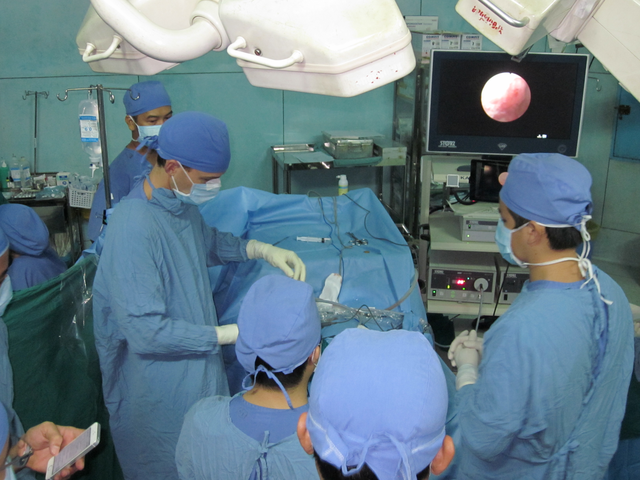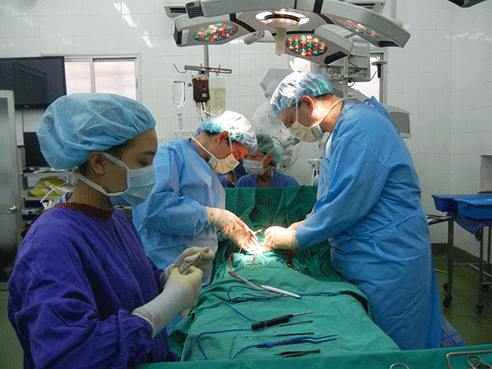 Jim Johnston Jr., M.D., performs surgery with a Vietnamese surgical team in Ho Chi Minh City.It is more than 8,000 miles from the campus of the University of Alabama at Birmingham to Hanoi, Vietnam. Yet new technology and a spirit of collaboration between UAB pediatric neurosurgeons with the Global Surgery Program at Children’s of Alabama and their counterparts in Vietnam have created a unique partnership benefiting surgeons and patients in Vietnam and Alabama.
Jim Johnston Jr., M.D., performs surgery with a Vietnamese surgical team in Ho Chi Minh City.It is more than 8,000 miles from the campus of the University of Alabama at Birmingham to Hanoi, Vietnam. Yet new technology and a spirit of collaboration between UAB pediatric neurosurgeons with the Global Surgery Program at Children’s of Alabama and their counterparts in Vietnam have created a unique partnership benefiting surgeons and patients in Vietnam and Alabama.
The Division of Pediatric Neurosurgery in the Department of Neurosurgery at UAB hosted two Vietnamese physicians this summer as visiting fellows in the Children’s Global Surgery Program in a collaboration focusing on improving epilepsy care.
“We began a relationship with Vietnamese physicians in 2013 when Dr. Brandon Rocque visited Ho Chi Minh City with Dr. Jerry Oakes, chief of Pediatric Neurosurgery at Children’s,” said James M. Johnston Jr., M.D., assistant professor of neurosurgery and director of the Global Surgery Program. “Based on our experiences there, we were asked to provide some of our expertise in total management in epilepsy to the neurosurgeons in Vietnam.”
Epilepsy is common in Vietnam, but a shortage of pediatric neurosurgeons places limits on how the condition is treated. Alabama, with a population of just 4.5 million, has five pediatric neurosurgeons. The northern district of Vietnam, centered around Hanoi, also has four pediatric neurosurgeons, but they tend a population of more than 50 million.
“Because of visits by Rocque, Oakes and myself to Vietnam, we knew that the surgeons were highly skilled,” Johnston said. “We thought we might be able to be of service in providing ongoing education and, most importantly, by helping to create standardized management protocols for complex surgical diseases which would promote efficiency and efficacy. For example, we could help them make better use of imaging, tests such as electrocardiography or patient care algorithms, as well as present the newest advances in the field.”
| “We don’t look at this as a medical mission,” Johnston said. “The Global Surgery Program at Children’s was established in order to facilitate and coordinate the development of comprehensive, multidisciplinary programs for surgical diseases based on strong, collaborative relationships with large pediatric hospitals in the developing world." |
Rocque, who first gained an appreciation for Vietnam when he spent several months there during medical school, performed the first corpus callosotomy in Vietnam during a 2015 visit. This is a complicated, fairly rare surgery done in cases of catastrophic epilepsy.
“I had the opportunity to demonstrate this surgery to Dr. Nguyen Lien, one of our primary Vietnamese collaborators in Hanoi,” said Rocque, an assistant professor of neurosurgery. “Dr. Lien has since performed 11 of these surgeries, so now they have a new technique in their tool box for cases of extreme epilepsy.”
“We don’t look at this as a medical mission,” Johnston said. “The Global Surgery Program at Children’s was established in order to facilitate and coordinate the development of comprehensive, multidisciplinary programs for surgical diseases based on strong, collaborative relationships with large pediatric hospitals in the developing world. Using our expertise and experience, we are able to advise, train and help our partners implement surgical techniques, perioperative protocols and other therapies that are most appropriate for their patients. The goal is to help them build more advanced programs to expand and enhance their therapy options for sick children in their countries.”
The UAB surgeons will continue to visit Vietnam, and Vietnamese physicians will come to Birmingham. Lien and Dang Tuan, M.D., a pediatric neurologist, spent two months at UAB this summer as Children’s Global Surgery Fellows.
“The Global Surgery Program focuses on more than just the operation,” Rocque said. “Together Dr. Tuan and Dr. Lien are working on setting up a comprehensive program that includes understanding which cases have the best prognosis for operation or which would be better treated medically. We’re working with them to set up their own EMU — epilepsy monitoring unit — modeled on ours at UAB. Seeing firsthand how one works was of tremendous benefit to them.”
 Dr. Brandon Rocque operates with Vietnamese colleagues in Hanoi on a child with epilepsy.“The two months spent at UAB were invaluable for us,” Lien said. “The opportunities to learn at the side of our American colleagues will allow us to set up similar systems in Vietnam which will improve our effectiveness and efficiency, ultimately allowing us to provide better care to more patients in the years to come.”
Dr. Brandon Rocque operates with Vietnamese colleagues in Hanoi on a child with epilepsy.“The two months spent at UAB were invaluable for us,” Lien said. “The opportunities to learn at the side of our American colleagues will allow us to set up similar systems in Vietnam which will improve our effectiveness and efficiency, ultimately allowing us to provide better care to more patients in the years to come.”
Hi-tech gadgetry has a role to play, too. Johnston and Rocque have also implemented a unique telemedicine tool called VIPAAR to interact with surgeons in Ho Chi Minh City. VIPAAR, or Virtual Interactive Presence in Augmented Reality, uses standard iPads and the internet to stream real-time images with interactive capability between remote sites. Now marketed under the name Help Lightning, the technology was first developed at UAB under the direction of neurosurgeon Bart Guthrie beginning in 2003.
“I can interact from my home in Birmingham with surgeons in Vietnam during the actual surgery,” Johnston said. “It’s as if I’m in the OR with them, providing another opportunity for consultation, training and interaction.”
Johnston has mentored colleagues in Ho Chi Minh City more than 25 times, and he and Rocque anticipate expanding use of VIPAAR in the coming months with their Hanoi-based colleagues.
“They are learning from us, and we are learning from them,” Rocque said. “VIPAAR is a great way to train fellows and residents from both countries. They can benefit from seeing our techniques, procedures and best practices, while their volume and complexity of cases provides great insight to our trainees.”
Johnston and Rocque recently published an article in World Neurosurgery about their experience in Vietnam with VIPAAR, and the technology is currently being installed for use across the CURE Hydrocephalus International network in sub-Saharan Africa and Bangladesh.
Research is another arena in which the Global Surgery Program is reaping benefits.
“Matthew Davis, a neurosurgery resident at UAB, recently created a traumatic brain injury database, tapping the expertise of epidemiologist Gerald McGwin, Ph.D., the director of Research for the UAB Center for Injury Sciences,” Johnston said. “That database will be populated with data from Vietnam and Ghana, another of our Global Surgery Program sites. They see a higher volume of TBI cases than we see in Birmingham, and this database will provide significant research information to power epidemiological studies that can lead to better understanding of head injury treatment and prevention.”
Johnston says the Children’s Global Surgery Program will continue building strong reciprocal relationships with major pediatric hospitals worldwide. Over the past three years, the program has hosted visiting fellows from Vietnam, Ghana, Angola and Kenya. In addition to programs in pediatric neurosurgery, the program also supports UAB/Children’s specialists in pediatric surgery, orthopedic surgery, cardiothoracic surgery and plastic surgery with collaborative projects in Vietnam, Kenya, Ghana and Mexico.
